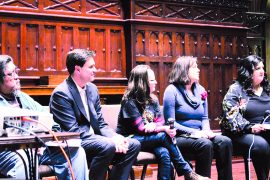In a press release issued on March 11, Governor Kate Brown outlined a four point plan responding to the threat of the novel coronavirus and the resulting disease, COVID-19. Oregon’s response comes after a global spread of COVID-19, which stands for coronavirus disease 2019 and is caused by a virus known as SARS-CoV-2. The virus has been identified in 316 patients in Oregon as of March 26.
Under the new strategy, all large gatherings will be cancelled. A large gathering is defined as “any event in a space in which appropriate social distancing of a minimum of three feet cannot be maintained” with more than 250 attendees.
Schools have been ordered to cancel all “non-essential school-associated gatherings and group activities,” including competitions and group trips. This directive follows the March 8 guidance that schools and universities remain open and consider all alternatives before closing. On March 11, Oregon State University and University of Oregon, issued statements of increased precautions against coronavirus transmission, including cancelling events and transferring classes and final exams to remote service models. Portland State University announced on March 12 that remaining classes and final exams would be conducted remotely. On March 18, the PSU announced that it will conduct all Spring term courses remotely.
Workplaces have been advised to increase distance between employees by limiting in-person meetings, travel, and staggering work schedules. Employees have been encouraged by the Centers for Disease Control and Prevention (CDC) not to enter their workplaces if they express symptoms that could indicate COVID-19.
Long-term care and assisted living facilities face the greatest threat from COVID-19, as the elderly and immunocompromised are at the highest risk of fatality from the disease. The Oregon Health Authority issued directives to long-term care facilities in a previous statement on March 10. The directives include restricting visitation to only essential visitors, documented screenings of all visitors for potential indicators of COVID-19, and utilizing virtual visits while increased limitations on socialization and community outings are in place.
On March 23, Brown issued a sweeping executive order in addition to the March 11 order that included prohibitions on all non-essential gatherings that cannot maintain a six foot distance between individuals and many non-essential business closures. The prohibitions do not apply to businesses selling food, medical facilities and pharmacies, or pet store services. The same executive order directs individuals to minimize travel to essential activities. Those found in violation of the executive order may be subject to a misdemeanor charge.
On March 22, Brown announced a moratorium on evictions for nonpayment related to the coronavirus pandemic. The decision followed a similar moratorium announced by Multnomah County Chair Deborah Kafoury and Portland Mayor Ted Wheeler on March 17. The Multnomah County order includes a six month grace period for repayment of rent in arrears.
The City of Portland has also responded to the elevated threat posed to unhoused individuals and communities. On March 11, Wheeler announced that people aged 60 or older who have pre-existing conditions and are living in group shelters will be temporarily moved to motels and other locations. No comment was made addressing the timeline of such a program. Commissioner Chloe Eudaly announced that a number of portable toilets and handwashing stations would be installed throughout the city. As of March 12, nine portable toilets and 13 handwashing stations have been installed.
Symptoms of COVID-19 include fever, cough, and shortness of breath. Patients concerned about COVID-19 have been advised to seek medical attention if they experience difficulty breathing, persistent pain or pressure in the chest, a newfound confusion or inability to arouse, or bluish discolouration of the lips or face. Patients have also been advised to call their doctor before seeking medical attention and to wear a facemask before entering a medical facility.
The CDC recommends that the public help prevent the spread of coronavirus by wearing a facemask when in close proximity to others when sick or attending someone who is ill, covering coughs and sneezes, washing hands and frequently touched surfaces often, and avoiding sharing personal household items.
Testing for coronavirus remains limited in the United States. According to the CDC, only 19,744 tests have been conducted nationwide as of March 14. Nationwide, only 1,629 patients tested positive for coronavirus as of March 13. According to The Atlantic, limitations in testing can be attributed to the difficulty of acquiring coronavirus specimens, which are required to manufacture tests, and a lack of universally accessible test analysis equipment. Further delays have been attributed to a slowdown in obtaining an emergency use authorization (EUA) from the Food and Drug Administration. An EUA is required to use recently developed tests that have not undergone full FDA approval.





